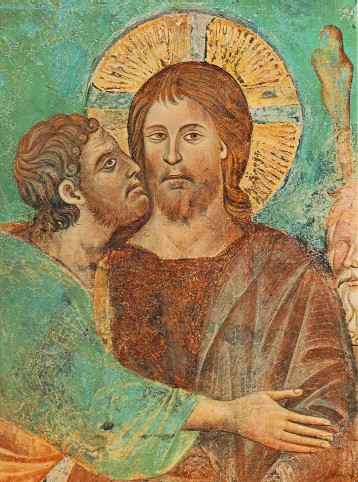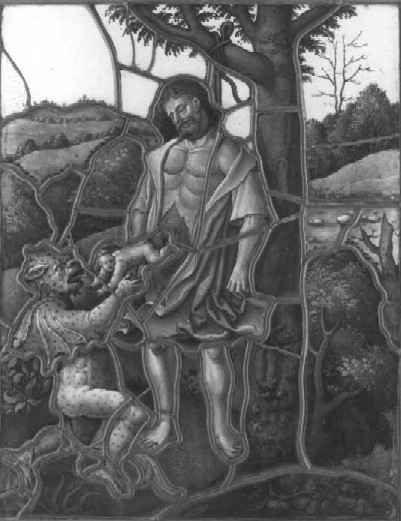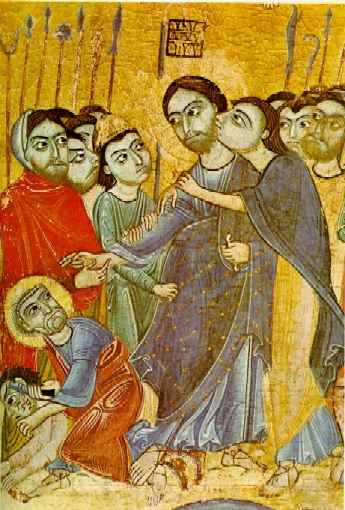|
Judas Iscariot Yeah, yeah, Jesus Christ gets all the press. He's noble, good hearted, infallible, blah, blah, blah. BORING! Sure, he founded the biggest religion in the world, but where's the drama? Where's the passion? Where's the suspense?
Yeah, yeah, Jesus Christ gets all the press. He's noble, good hearted, infallible, blah, blah, blah. BORING! Sure, he founded the biggest religion in the world, but where's the drama? Where's the passion? Where's the suspense? Everybody loves a tragedy, which is probably why the figure of Judas Iscariot is such an object of fascination in the literary world. After all, we pretty much get Jesus' motivation. At least within the context of the story, it's hard to miss. He's the son of God. He's here to rescue us all, die on the cross, rise again, etc., etc. But the motivations of Judas, a key player in all this, are much murkier and touch on some universal philosophical questions. Judas first pops up in the Bible as a name on the list of Jesus' 12 apostles. He's the guy who carried the money. Prior to the Last Supper, he distinguished himself primarily by expressing concern for the poor, for which he is roundly lambasted by Jesus: 12:3 Then took Mary (possibly Mary Magdalene) a pound of ointment of spikenard, very costly, and anointed the feet of Jesus, and wiped his feet with her hair: and the house was filled with the odour of the ointment.  So there you have it. Screw the poor, take care of The Man. Smackdown on Judas! Only the Gospel of John includes the "thief" allegation, but then given the reputation Judas was to later acquire, it's not surprising that the author of John would think the worst of him.
So there you have it. Screw the poor, take care of The Man. Smackdown on Judas! Only the Gospel of John includes the "thief" allegation, but then given the reputation Judas was to later acquire, it's not surprising that the author of John would think the worst of him. Just when Jesus was really getting to be the Next Big Thing, Judas turned on him. The gospels all agree that Judas went to the Jewish authorities, who were not especially pleased with Jesus' lack of respect for authorities, and offered to turn over his fearless leader for price. This was done, the Gospels explain, at the instigation of Satan. Judas agreed to hand Jesus in for 30 pieces of silver, which was enough money to maybe buy a new chariot with whitewall tires but not enough to retire on. Judas led the authorities to the Garden of Gethsemane, where he kissed Jesus hello so the authorities would know who he was. The kiss is a nice dramatic touch, but it doesn't make a lot of sense. Were the authorities so incompetent that they couldn't identify their own suspects? After all, the whole REASON they were arresting Jesus was that he had become a popular public figure. And yet, no one had any idea who he was? They couldn't just ask? They couldn't just arrest everyone and figure it out later? Wouldn't Jesus have voluntarily identified himself? He seems like that kind of guy. WHATEVER. There's a kiss, and arrest, and pretty soon Jesus sleeps with the fishes. For three days. That's another story. We're talking about Judas here. According to a mix of lore and Biblical accounts, Mr. Iscariot either purchased a field with his ill-gotten booty or threw it back in the faces of the authorities. Either way, he realized he had screwed up, big time, and hanged himself in remorse. He must have done a good job of it, since according to his fellow apostle Peter, he "burst asunder in the midst: and all his bowels gushed out." The story of Judas raises some pesky questions about free will and predestination. Jesus foretold Judas' betrayal before it happens, raising some weird questions about exactly why Judas did what he did. Was he predestined to do so? Did Jesus actually give him the idea?
This viewpoint has been celebrated in dozens of novels and modern revisions of the gospel stories, most notably in the movie, Jesus Christ Superstar, in which Judas (played by Carl Anderson) is a well-intentioned but confused individual who gets all the best songs. Other authors, especially in antiquity, have been less kind. Dante described the place of Judas in the ninth circle of Hell, where the jaws of Satan eternally grind him to bloody mush. Fable also identifies Judas as the first vampire, a theory which is meant to explain the vampire's traditional aversion to crosses, silver (due to the 30 pieces angle) and wood (the wood of the cross, or the tree on which he hung himself prior to becoming undead). Medieval torturers named an implement after the betrayer, the Judas Cradle, a gigantic sharp-tipped iron pyramid in which the victim was slowly lowered onto the apparatus, anus first, after which they would, naturally, "burst asunder" and their "bowels gush out." |
 An early
An early